7 BEST FIREWALL FOR HOME NETWORK IN 2022

Best firewall for home network.
It’s no secret that home networking has become increasingly complex. The average home router now has to support a variety of devices, from laptops and smartphones to streaming devices and gaming consoles.
And as more and more devices connect to the internet, the risk of cyber attacks increases. That’s why it’s important to have a good firewall in place to protect your home network.
A home network firewall device is a crucial piece of security equipment. It protects your home network from external threats and can be customized to fit your specific needs. There are many different types of firewall available, so choosing the right one can be tricky.
To help you make the best decision for your home network, we’ve compiled a list of the 7 best firewalls for home networks in 2022 and 2023.
What is a Firewall
Since the 1980s, firewalls have been the first line of defence in network security. The term “firewall” is just a metaphor for a type of physical barrier put up to limit the damage a fire can do and a virtual barrier that limits the damage a cyberattack can do.
A firewall is basically a wall that keeps bad things from getting onto your property. This is why it is called a firewall. Its job is like a physical wall that keeps a fire from spreading from one area to another.
Firewalls are software or hardware that filters the data that tries to get into your computer or network. Firewalls look through packets for malicious code or attack vectors that have already been identified as known threats. If a data packet is flagged and found to be a security risk, the firewall stops it from entering the network or reaching your computer.
Firewall- Hardware vs. Software
Software Firewalls
If you have a firewall device on your computer, it is a software firewall, and most likely an application-level firewall. It will be able to control how each application connects to the internet and stop known or unknown applications from sending or receiving information.
Personal firewalls are also software firewalls. This means that the program’s functions are controlled by code on your computer.
The benefit is obvious: you can easily change the firewall’s settings whenever you want, and you can use its interface without logging into a separate piece of equipment.
But a software firewall can be hacked if the system it’s installed on is compromised.
For example, if your computer was infected with malware despite having a firewall and other security measures, the malware could be designed to get around the firewall or change its settings.
Because of this, software firewalls are never completely secure.
Here are some of the benefits of a software firewall:
- Cost less at first: When you first buy a software firewall, it’s not too expensive. Some come with a free trial, and after that, you pay a low monthly fee. In the long run, though, the subscription cost may end up being more expensive than what you would have paid for a hardware solution.
- Need little space: If space is a concern, software may be a better option because as an application, it has no footprint.
- Easy to set up: Many software firewalls only need a few clicks to be up and running, while hardware firewalls need to be wired, connected to power, and placed in the right place.
Hardware Firewall
Hardware firewalls are a great option for small, medium and large organizations that need to protect their devices. These types of firewalls are designed to sit in front of the network and inspect traffic before it leaves the organization.
They can be used to limit access to certain ports and services, or they can be configured to block certain types of traffic entirely.
Like all security solutions, hardware firewalls require significant maintenance and upkeep in order to function properly. Additionally, their performance can vary depending on the type of device being protected.
If you’re looking for a starting point for your organization’s security strategy, consider adding a hardware firewall to your arsenal. These devices can provide your organization with a layer of protection from cyber attacks while also helping to maintain control over sensitive data.
Here are some of the benefits of using a hardware firewall:
- Increased security: A hardware firewall adds an extra layer of security to your network, making it more difficult for hackers to gain access.
- Customization: You can customize a hardware firewall to fit the specific needs of your home network or business, such as blocking certain types of traffic or allowing only certain types of devices to connect to your network.
- Improved performance: A hardware firewall can help improve the performance of your network by regulating traffic and reducing the amount of data that is transferred between devices on your network.
- Can make it easier for other server resources to do their job. For example, you can turn off software firewalls, which can free up memory and processor power that is desperately needed.
How Firewall Device Works
A firewall is a system that looks at network traffic based on rules. A firewall will only let connections in that it has been set up to allow.
It does this by letting or blocking certain data packets, which are small pieces of information you send over digital networks, based on security rules that have already been set up.
A firewall acts like a security guard at the port, or entry point, of your computer. Only IP addresses that are known to be safe are allowed in.
IP addresses are important because they identify a computer or source, just like your home address identifies where you live.
A Firewall protects a computer, tablet, or other device in three ways:
- Packet Filtering
- Proxy Service
- Stateful Inspection
Firewalls use one or more of the following three ways to control the flow of traffic into and out of a network:
Packet filtering
This is the process of comparing small pieces of data, called packets, to a set of rules, or filters. Only the packets that get through the filters are sent to the system that asked for them.
Proxy service:
The firewall gets information from the Internet and sends it to the system that asked for it, and vice versa.
Stateful inspection
This is a newer method that doesn’t look at the contents of each packet but instead compares certain key parts of the packet to a database of trusted information.
Information going from inside the firewall to the outside is checked for certain identifying traits, which are then used to compare incoming information. If the two things are similar enough, the information is let through. If not, it is thrown away.
What You Should Know About Firewalls Before Buying One
Firewalls can’t control traffic that doesn’t go through them, so they can’t protect it. This means that our devices can be easily infected by flash drives or any other type of external storage.
Because of this, you shouldn’t use a firewall as a replacement of antivirus software. Instead, you should use both.
An antivirus will protect you from viruses that a firewall can’t find. This makes firewalls and antivirus programmes the perfect pair. So, it is very important to choose the right firewall for you.
Why is Firewall Important For Home Network and Small Business?
Cyberthreats are common and keep getting worse. Cybercriminals can hurt your network and the personal information you keep on your computer.
It’s important to use the defences you have to protect your network and the personal information on your computer from cybercrimes.
Here are the three main dangers of not having a firewall:
Open access
Without a firewall, you’re letting anyone connect to your network. You wouldn’t have any way to know when danger is coming. That could make your devices vulnerable to hackers.
Lost or compromised data
If you don’t have a firewall, your devices could be exposed, which could let someone take control of your computer or network. Cybercriminals could delete your data. Or they could use it to steal someone’s identity or commit financial fraud.
The network crashes
Without a firewall, hackers could shut down your network. Getting it running again and trying to get your stored data back could cost you time and money.
Firewalls are an important part of security technology, especially when different kinds of firewalls work together to form an umbrella of protection.
Firewalls can help to keep your network, computer, and data safe and secure.
The 7 Best Hardware Firewall for Home Network in 2022
Here are some of the best hardware firewalls that you can use for your home network
1. Bitdefender box 2

The Bitdefender Box 2 is made to protect your home network and Internet of Things (IOT) devices in a simple way. After you connect the device to the router, it will automatically start to monitor and improve the security of your network.
With a dual-core processor that runs at 1.2 GHz, the device can reach speeds of up to 1 Gbps. It also works with the latest smart home controllers, like Amazon Alexa and Google Assistant.
This is also a WiFi router with Dual-Band (2.4GHz and 5GHz) AC1900 speed wireless radio, which protects both wired and wireless devices in the home.
The hardware firewall has the usual monitoring and security features.
It also protects devices that cannot have a local anti-virus programme installed on them.
The Bitdefender Total Security antivirus service gives you more ways to keep yourself safe. You get a free one-year membership, and after that, you can pay for memberships every year (for protection of unlimited home devices).
This firewall is compatible with Windows, Mac, iOS, and Android devices, and it also has VPN.
Bitdefender Box can also be used as a personal firewall, especially by parents who want to keep their kids from going to websites they aren’t supposed to.
What to be aware of.
- Bitdefender BOX units are no longer available for purchase. They are no longer being manufactured due to post-pandemic market conditions.
2. Netgate SG-2100 pfSense Security Gateway Appliance
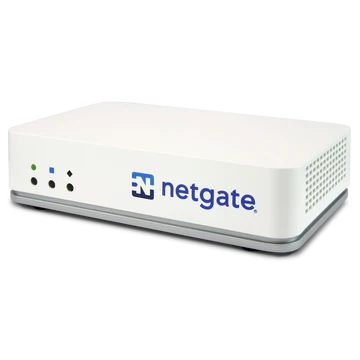
A partnership between the open-source software firewall distributions company pfSense and the cybersecurity company Netgate led to this firewall hardware device solution.
The Netgate 2100 is a small, powerful desktop device. Using a Dual core ARM Cortex A53 processor at 1.2GHz and 4GB of DDR4 RAM, the Netgate 2100 excels as a 2.20 Gbps router, 964 Mbps firewall, or 254 Mbps IPsec VPN solution.
The Netgate SG-2100 is a powerful security gateway appliance that provides a secure, reliable and customizable firewall and VPN solution. It supports multiple LAN and WAN interfaces, as well as a variety of security features, including: intrusion prevention, traffic shaping, URL filtering, MAC filtering, DDoS mitigation, and more.
The SG-2100 also includes a stateful packet inspection firewall and VPN with support for OpenVPN, SSL/TLS, L2TP, IPSec, and PPTP.
The SG-2100 is perfect for small and medium businesses, remote offices, and home users who want to build a secure, reliable and customizable firewall and VPN solution.
3. Ubiquiti Unifi Security Gateway (USG)
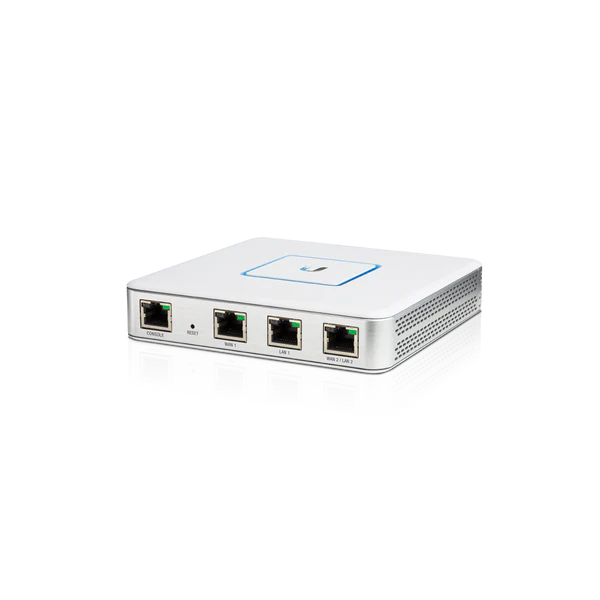
Ubiquiti Unifi Security Gateway is mostly a router, but it can also connect to other devices. It also has gigabit ethernet speeds and works as a firewall to keep people from getting into your network. This device can be used for both home and business networks because it has two functions in one.
The amazing firewall is like a gatekeeper that routes all traffic before it even gets to the router. This makes sure that the incoming traffic is well watched and protected through the advanced network management features.
4. CUJO AI Smart Internet Security Firewall
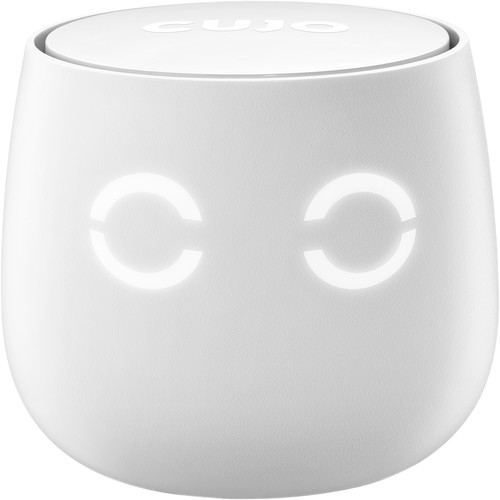
This is an AI-powered firewall appliance that protects your home office from network-based threats. It is based on CUJO’s exclusive Artificial Intelligence (AI) and Machine Learning (ML) innovations.
CUJO AI is a company that uses machine learning, data science, and AI to create a multi-solution AI-driven software platform for network operators. The firewall is one of the company’s best products.
The CUJO AI Smart Internet Security Firewall is made for use at home or in a business. It protects all devices connected to it from viruses, malware, and phishing. It connects straight to the WiFi router and can handle Internet speeds of up to 1 Gbps.
The machine learning classifier of the firewall learns from different data sets. Then, the ML algorithm looks for suspicious or malicious activity in network traffic.
Once that’s done, the algorithm looks for suspicious patterns in network traffic and sends alerts for both known and new threats.
Not only that, but the firewall can also tell by comparing behaviour patterns if a website or app could be dangerous.
5. Zyxel Next Generation VPN Firewall
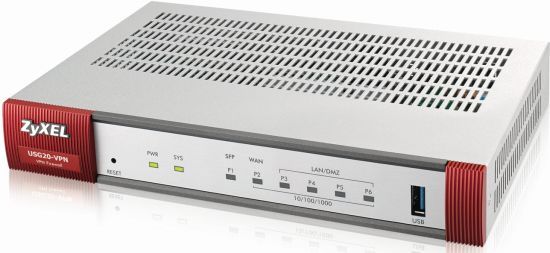
Zyxel Next Generation is a VPN firewall that protects the network from cyberattacks without slowing it down. It gives security both locally and remotely, since users can use secure VPN connections to connect to their local networks from afar.
Because it can process information faster, it stops attackers from being able to decrypt VPN tunnels. One of the best things about this firewall is that when the main connection goes down, it automatically switches to the backup connection and then back to the main connection when the main connection comes back online.
It also has a filter for website content, which is an important part of any firewall. It is one of the most sought-after firewalls on the market right now.
This device was made to help businesses with better security and remote VPN connections. But because it is easy to set up and not too expensive, it can also be used at home.
6. Firewalla
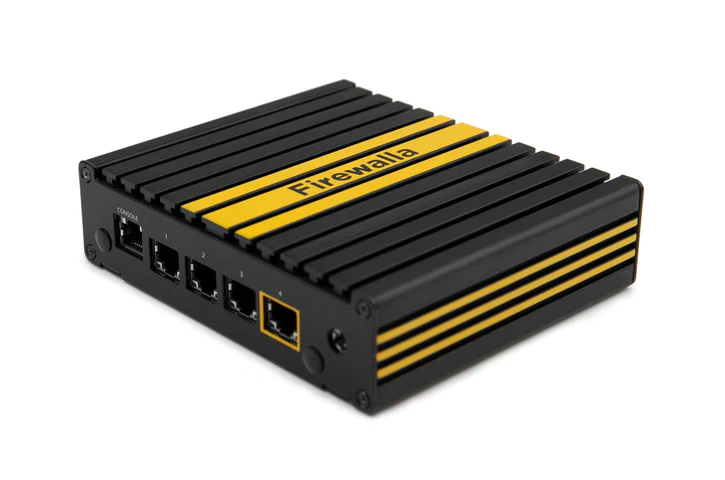
Firewalla is a popular hardware firewall that is also very easy to set up. Firewall has you covered whether you are a home owner or a business owner with less technical know-how. It uses AI and is a mix of Firewall, IDS, IPS, Behavior Engine, Network Management Station, VPN server, etc.
Firewalla is made so that it not only notices when new devices connect to your network, but it can also turn them off if something seems wrong. It would let you know when someone tries to hack into your security camera or any other device that is connected to it.
One of the best things about this firewall is that it alerts you when you click on a bad link (phishing, malware) on your PC, tablet, or phone, as well as when your phone or other device installs malware or is infected.
Firewalla’s unique intrusion prevention system (IDS and IPS) protects all of your wired and wireless Internet of Things devices at home from threats like viruses, malware, hacking, phishing, and unwanted data theft when you’re using public WiFi.
It’s easy to use and affordable for families, businesses, and professionals.
7. WatchGuard Firebox T15
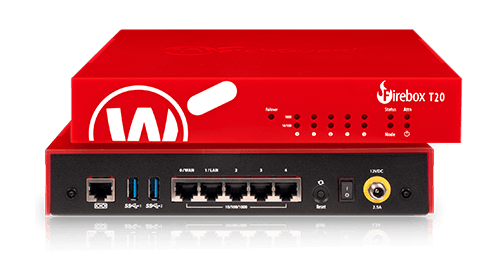
The WatchGuard Firebox T15 is a firewall device that can be set up anywhere on the network without any problems. The Firebox T15 is one of the most popular devices for a small office or home office. It can also be used by large companies to protect remote workers and smaller sites with full UTM.
This device comes with a Total Security Suite and is an affordable way to protect your computer. The WatchGuard Firebox T15 has you covered whether you want to stop ransomware or stop data loss.
What To Think About When Choosing a Firewall Device to Protect Your Home
Not sure what you want your firewall to do for you? Let us show you some important things to think about before you make your purchase.
Protection and Prevention
One of the most important things about your firewall is probably how well it protects you and stops any possible threats to your computer or other devices. You want a firewall that can keep track of and control all the applications and data that enter and leave your network.
These can then limit the amount of traffic coming into your computer and the risks to your network by only allowing approved programmes run. This is similar to an ad blocker you might have on your web browser.
Look for a firewall that will let you scan these applications to make sure they don’t contain any potential threats. Check out firewalls that do regular scans in the background.
Device Tracking
Monitoring your devices is a useful feature you won’t want to be without. It lets you find a device not just by its IP address, but also by its username. You can keep a close eye on how many devices each network user connects to the infrastructure by monitoring the devices.
It’s a great feature for people who have multiple devices in their home or run a small business from home. Now that you have control, you can see everything.
Throughput
A firewall throughput is a feature of hardware firewalls. Usually, you can choose from a variety of firewall throughputs. Hardware firewalls that are low-end to mid-range will have a throughput of about 500Mbps.
As the number of people using your network grows, you will need a firewall to keep up with the demand. You will want to look at those with up to 1Gbps throughput to support multiple users and keep you all safe without sacrificing speed.
Before you buy your hardware, you should think about how many people will be using the network. This will keep you from being disappointed later.
Remote Coverage
You should also think about remote coverage when looking for a new firewall. To keep the highest level of security at all times, you need to keep an eye on and control all traffic coming in and going out.
You will also want remote users to be able to connect to infrastructure and have some control over what they can do and where they can go.
You can also protect your devices when you’re not at home with remote coverage, which is something you should look into before buying a firewall.
Infrastructure that is Simplified
Your firewall is the best place to put all of your security. There’s no reason to run multiple programmes to keep your home safe when one will do everything.
Look for firewalls that have built-in antivirus protection, spam filtering, application filtering, and deep packet inspection so you don’t miss out on protection or have to spend more money on extra security. Find the one that can do everything.
Location of controls
Some firewalls will give you some control over who is using your network. You will be able to give and take away access to certain apps, as well as limit their use to specific functions within an app.
These give you much better control and visibility over your network as a whole. They can be helpful if you have children or other people in your home who use the network and internet. They can also help people who run small businesses from their homes and need to keep applications private for data security reasons.
When buying a firewall for your home, you should think about these things and whether you will need them.
Cost
Price is always an important thing to think about, no matter what. Prices for firewalls can vary depending on how big they are and how well they protect. After all, some of the firewalls on the market today could be used by businesses.
Set a budget and try to stick to it as much as possible while looking. Set your budget by thinking about how often you will use your firewall and how much you are willing to pay for it.
Remember that you don’t have to spend a lot of money to get a good firewall for your home. There are firewalls for every budget.
Final Thoughts
Choosing a new home firewall is an important decision, and the market offers a lot of great choices. There’s a firewall out there that can do anything you need it to, whether that’s providing extra security or keeping tabs on how many devices are connected to your network.
All of these products we have listed offer great protection for your home network and are easy to set up and use. Choose the one that best fits your needs and budget and enjoy peace of mind knowing your home network is protected.
All of these products offer great protection for your home network and are easy to set up and use. Choose the one that best fits your needs and budget and enjoy peace of mind knowing your home network is protected.
Need help with security? Cyb-Uranus can help you implement security measures to secure your home office.

